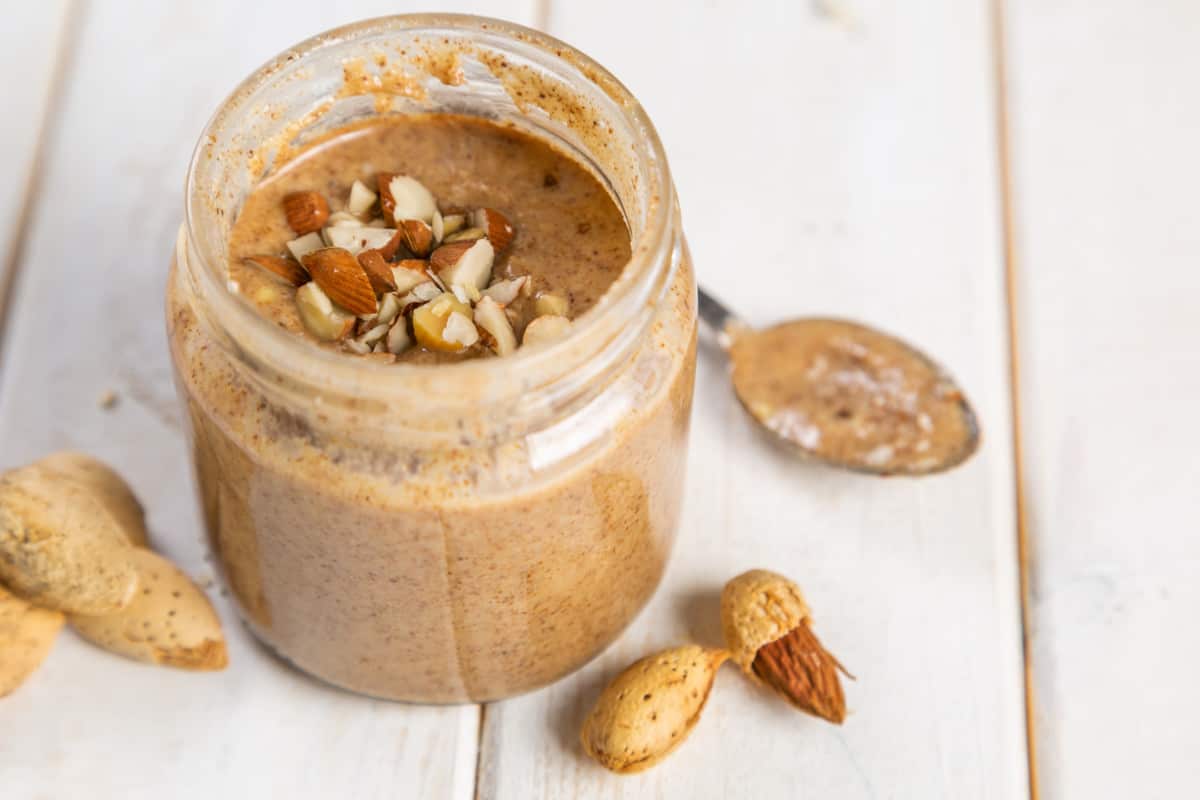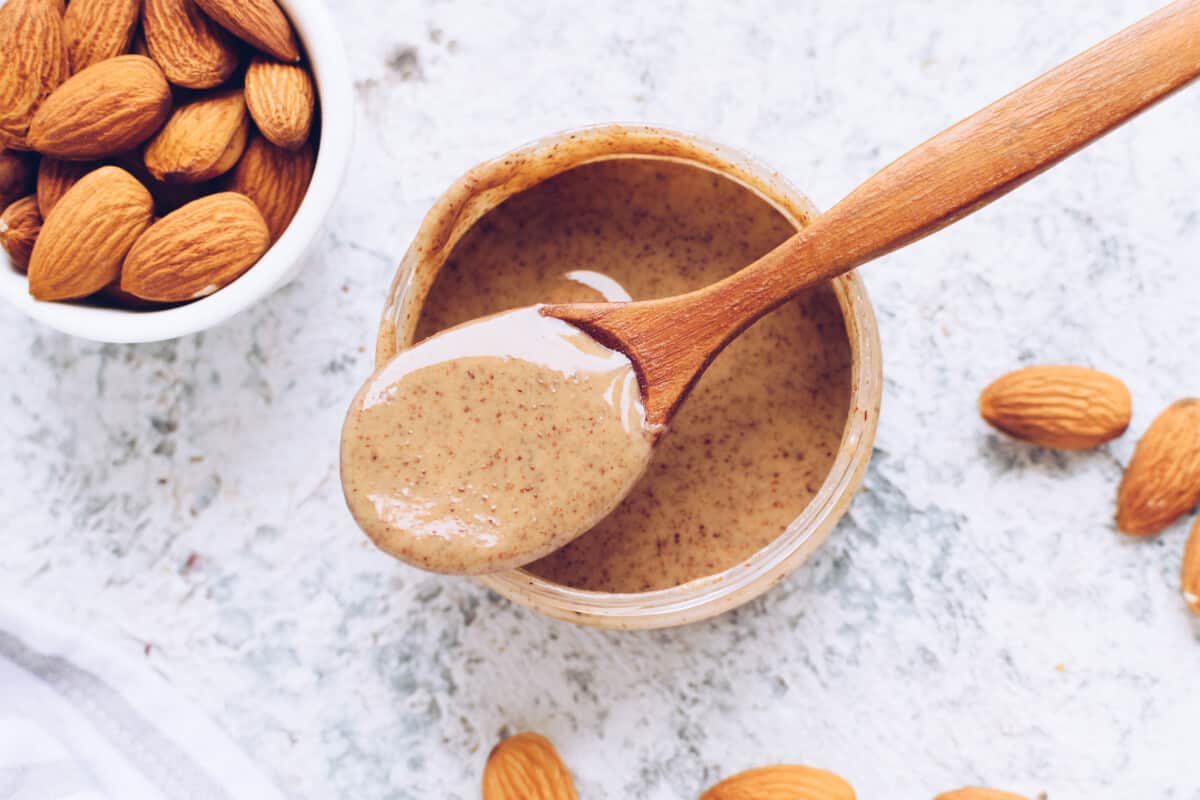So in the battle of almond butter vs peanut butter who is the king of the nuts?
You’ve most likely have seen a lot of people who eat healthy who’ll be quick to tell you eating almond butter is better. But is almond butter really better for you from a nutritional standpoint or is it just pretending to be fancier peanut butter?
Nut butters are a super food and one of my favorite weight loss snacks that you can carry around you with ease. But once you start breaking down the nutrition not all of these nut butters are created equal.
Here you’ll discover the true winner of the nut butter battle in regards to nutrition and weight loss.
Is Almond Butter or Peanut Butter Better for Weight Loss

When you first look at the nutrition of both nuts you’ll see they’re quite similar. Well, technically almonds have a little fewer calories, fewer carbohydrates, more fiber, more protein, more healthy fats, and more vitamins and minerals.
But when you start increasing the amount of these two nut butters the differences really start to add up. So you can see just how much better the macronutrients and micronutrients of the almond butter will be in the long run over its rival.
Almond butter is higher in the healthier monounsaturated fats which have been linked to improvements in heart health and weight loss (1,2). And peanut butter has double the amount of saturated fats. Now I’ll be the first to tell you the demonization of saturated fats are highly overblown and new studies are confirming some is good for you (3,4).
In an ideal world eating either nut butter isn’t going to make up the bulk of your nutritional intake for the day. So if you’re only eating a couple of tablespoons then you should be fine without adding a whole lot of extra calories to your daily intake.
Studies have found adding almond butter to your diet can help with weight loss (5). It helps that almond butter is more satiating which will help you feel fuller for longer (6). Plus the higher fat content will keep your blood sugar low so there is less chance of an insulin response in your body (7).
Both of these nut butters could still help you lose weight even though both of them are relatively higher in fats. According to studies eating 5 or more servings a week could help lower the risk of heart disease (8).
So both nut butters can help you lose weight when eating in moderation. But in the big picture almond butter is going to be better at it.
Almond Butter Nutrition: The Benefits

The big advantage of almond butter and peanut butter is the former is an actual nut while the latter is technically a legume. Legumes (like beans) can contain lectins and phytic acid which can damage your gut lining and prevent nutrient absorption (9,10).
Lectins can cause autoimmune reactions in your body when they make it into your bloodstream (11). Usually, cooking legumes destroys most of these lectins but this is one the reasons why peanuts can cause such crazy allergies in people. Phytic acid isn’t good for you because it’ll prevent the absorption of nutrients in the foods you’re eating (12).
Both almond butter and peanut butter can be eaten on a Keto diet but only almond butter is Paleo. This is because legumes (peanut butter) aren’t allowed on a Paleo diet for the above reasons.
Studies have found eating almond butter can result in improved insulin sensitivity in those participants with pre-diabetes (13). One of the big causes of obesity and weight gain is chronic insulin responses in the body (14).
Almond butter contains 4 times the amount of vitamin E than peanut butter. Vitamin E is a powerful antioxidant that can help prevent heart disease and help with weight loss (15,16). Vitamin E in almond butter has also been found to strengthen and improve bone health. Getting enough vitamin E in your diet can be harder than you think so eating more almond butter can help.
A tablespoon of almond butter has 45 mg of healthy magnesium which is a vital mineral used as a cofactor in over 300 enzymatic reactions in the body (17). Many people are deficient in magnesium which can result in fatigue, depression and other health problems (18).
Pros & Cons of Peanut Butter
One of the surface level problems of peanut butter is that it’s high in omega-6 fatty acids. Too many omega-6s like those in peanut butter in the diet have been linked to inflammation, heart disease, weight gain, and insulin resistance (19,20,21,22). For this reason alone I would generally steer clear of peanut butter. Yet also consider omega-6 fatty acids are an essential fat meaning your body needs them so a little bit of peanut butter isn’t the worst.
But in the modern western diet people eat far too many of them which leads to all those health diseases. This is why it’s a good idea to supplement with an omega-3 krill or fish oil. But in the grand scheme of things if you’re eating a healthy well-omega-balanced diet then eating a little bit of it should be okay.
Peanut butter also can also contain aflatoxins which is a fungi toxin that can be harmful to your health and is carcinogenic (23,24). Many nuts can contain them but peanuts are known to have the highest amount since most pesticides are used on them. The FDA limits how much aflatoxins can be present in food before they’re allowed to be shipped to consumers but low amounts still make their way into your body.
All of the above can cause gut problems with people who eat peanuts or peanut butter. Of the two almond butter is generally easier to digest than peanut butter for most people. One study found eating almonds can significantly increase the amount of healthy gut microbiota (25).
As far as calories if you compare Trader Joe’s butter almond and peanut butter then the former contains 5.85 calories per grams and the latter contains 6.16 calories per grams.
The Winner Revealed: Which is More Fattening?

In the nutritional battle of the best nut butters… the winner is almond butter!
Almond butter is the best of the nut butters with better nutritional profile with fewer calories, fewer carbs, more protein, healthy fats, more fiber, and more vitamins and minerals. So in the big picture eating almond butter over peanut butter is going to better for weight loss.
Many people also say almond butter is more filling of the two nut butters. And there’s something about peanut butter that makes it crazy addicting. It’s impossible to eat just one or two tablespoons!
But you also have to put your own taste preferences with these nut butters into consideration. If you despise the taste and texture of almond butter then you don’t have to force yourself to eat it. Peanut butter isn’t all bad in small amounts. So if you really choose the lesser of the two then I say just go for a little bit of peanut butter.
If you have trouble overeating on peanut or almond butter then I’d recommend picking up the individual packs of nut butters. Having controlled serving sizes of nut butters can help a lot to prevent overeating either almond butter or peanut butter.
It’s best to eat nut butters sourced from raw nuts since you’ll be sparing yourself the oxidation that can occur during the heating and pasteurization process. But in the U.S. all almonds must be pasteurized so they’re not truly raw.
And finally, make sure to check the nutrition label on the back of the container for all nut butters. Many almond butters and peanut butters can still contain added sugars. The healthiest peanut butter will contain no partially hydrogenated oils. Ideally, you’ll choose a nut butter one that is raw, organic and has zero added ingredients.
Is almond butter good for weight loss?
Yes, there are quite a few studies backing up how almond butter is good for weight loss. Almond butter contains protein, fiber, good fats and micronutrients that are beneficial for weight loss making it the king nut butter. With that said just make sure you don’t eat the whole jar of almond butter in one sitting as these calories can add up in the end.
The Last Word
So in the battle of peanut butter vs almond butter, the latter is the clear winner. Both nut butters contain healthy fats in the form of monounsaturated fat and saturated fat. Healthy fats have been found to be heart healthy and lead to improved heart health. Saturated fat has long been linked to heart disease but recent studies have found some can be beneficial (26). Almond butter also contains way more vitamin E which has also been found to be heart healthy.
Just because nut butter contains a higher amount of calories this doesn’t mean having a spoonful or two of organic peanut butter or almond butter is going to kill you and make you pack on 10 pounds. I generally eat and recommend almond butter and it may help you actually end up losing weight in the long run. Taking one tablespoon of almond near bedtime can curb hunger pangs while dieting so you can get a good night sleep.
But if you really love peanut butter and your diet is generally good then having a little here and there can actually be beneficial. This nut butter contains both monounsaturated fat and saturated fat but it may help with heart health. Going lower carb and replacing bad foods that have added sugar with a nut butter may help reverse type 2 diabetes.
You might want to make sure you’re taking an omega 3 fatty acid to counter the omega-6s in peanut butter. This is a big reason why I prefer almond butter. Almond butter contains way less saturated fat and more healthy vitamins like vitamin E. And if you want to lower your risk of cardiovascular disease than almond butter will be the better choice.
Cashew butter and walnut butter are two more nut butters that are good for you. So if peanut and almond butter aren’t for you then maybe try cashew butter. But when the time comes for that creamy goodness to cover the roof of your mouth the best choice is raw and organic almond butter.
Josh holds a Bachelor’s degree in Exercise Physiology and Nutrition Science. He’s a Certified Strength and Conditioning Specialist (CSCS) by the National Strength and Conditioning Association and he’s a Certified Personal Trainer (CPT) by American Council on Exercise. He’s worked as a Strength and Conditioning Coach at the high school and college levels. He has over 15 years of experience as a personal trainer and nutrition coach. He strives to bring inspiration and results for people to live healthier lives through smart diet and exercise.



